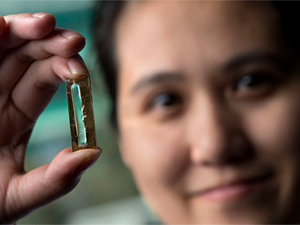



Date:17/09/16
 Researchers at the University of California, Irvine (UCI) have discovered a way to design a battery so it doesn’t lose its charge after years of use. The team found that by using a gold nanowire in electrolyte gel rather than lithium, a battery could withstand 200,000 charging cycles and only lose 5% of its capacity.
Researchers at the University of California, Irvine (UCI) have discovered a way to design a battery so it doesn’t lose its charge after years of use. The team found that by using a gold nanowire in electrolyte gel rather than lithium, a battery could withstand 200,000 charging cycles and only lose 5% of its capacity.
After playing around in the university’s lab, it was doctoral student Mya Le Thai who initially made the discovery, one which could lead to rechargeable batteries that last up to 400 years. This means longer-lasting laptops and smartphones, and fewer lithium-ion batteries accumulating in landfills.
Originally, the researchers were experimenting with nanowires for potential use in batteries, but found that over time, the fragile, thin wires would break down and crack after multiple charging cycles. It was on a whim that Thai coated a set of gold nanowires in manganese dioxide and a Plexiglas-like electrolyte gel.
“She started to cycle these gel capacitors, and that’s when we got the surprise,” said chair of the university’s chemistry department, Reginald Penner. “She said, ‘this thing has been cycling 10,000 cycles and it’s still going.’ She came back a few days later and said ‘it’s been cycling for 30,000 cycles.’ That kept going on for a month.”
Thai’s breakthrough is incredible, considering the average laptop battery lasts 300 to 500 charging cycles. The nano-battery developed at UCI survived 200,000 cycles in three months, meaning it could extend the life of the average laptop battery by about 400 years.
Of course, the researchers realized the amount of gold nanowire needed to create this battery would drive up prices, so they suggested nickel could be a substitute for mass production.
Student accidentally creates rechargeable battery that lasts 400 years
 Researchers at the University of California, Irvine (UCI) have discovered a way to design a battery so it doesn’t lose its charge after years of use. The team found that by using a gold nanowire in electrolyte gel rather than lithium, a battery could withstand 200,000 charging cycles and only lose 5% of its capacity.
Researchers at the University of California, Irvine (UCI) have discovered a way to design a battery so it doesn’t lose its charge after years of use. The team found that by using a gold nanowire in electrolyte gel rather than lithium, a battery could withstand 200,000 charging cycles and only lose 5% of its capacity.After playing around in the university’s lab, it was doctoral student Mya Le Thai who initially made the discovery, one which could lead to rechargeable batteries that last up to 400 years. This means longer-lasting laptops and smartphones, and fewer lithium-ion batteries accumulating in landfills.
Originally, the researchers were experimenting with nanowires for potential use in batteries, but found that over time, the fragile, thin wires would break down and crack after multiple charging cycles. It was on a whim that Thai coated a set of gold nanowires in manganese dioxide and a Plexiglas-like electrolyte gel.
“She started to cycle these gel capacitors, and that’s when we got the surprise,” said chair of the university’s chemistry department, Reginald Penner. “She said, ‘this thing has been cycling 10,000 cycles and it’s still going.’ She came back a few days later and said ‘it’s been cycling for 30,000 cycles.’ That kept going on for a month.”
Thai’s breakthrough is incredible, considering the average laptop battery lasts 300 to 500 charging cycles. The nano-battery developed at UCI survived 200,000 cycles in three months, meaning it could extend the life of the average laptop battery by about 400 years.
Of course, the researchers realized the amount of gold nanowire needed to create this battery would drive up prices, so they suggested nickel could be a substitute for mass production.
Views: 534
©ictnews.az. All rights reserved.Similar news
- Azerbaijani project to monitor disease via mobile phones
- Innovative educational system to be improved under presidential decree
- NTRC prolongs license of two TV and radio organizations for 6 years
- Azerbaijan establishes e-registry for medicines
- Azerbaijani museum introduces e-guide
- Nar Mobile opens “Nar Dunyasi” sales and service center in Siyazan city
- International conference on custom electronic services held in Baku
- OIC secretary general to attend COMSTECH meeting in Baku
- Azerbaijan develops earthquake warning system
- New law to regulate transition to digital broadcasting in Azerbaijan
- Azerbaijani State Social Protection Fund introduces electronic digital signature
- Intellectual traffic management system in Baku to be commissioned in December
- Tax Ministry of Azerbaijan started receiving video-addresses
- World Bank recommends Azerbaijan to speed up e-service introduction in real estate
- Azerbaijan to shift to electronic registration of real estate





















